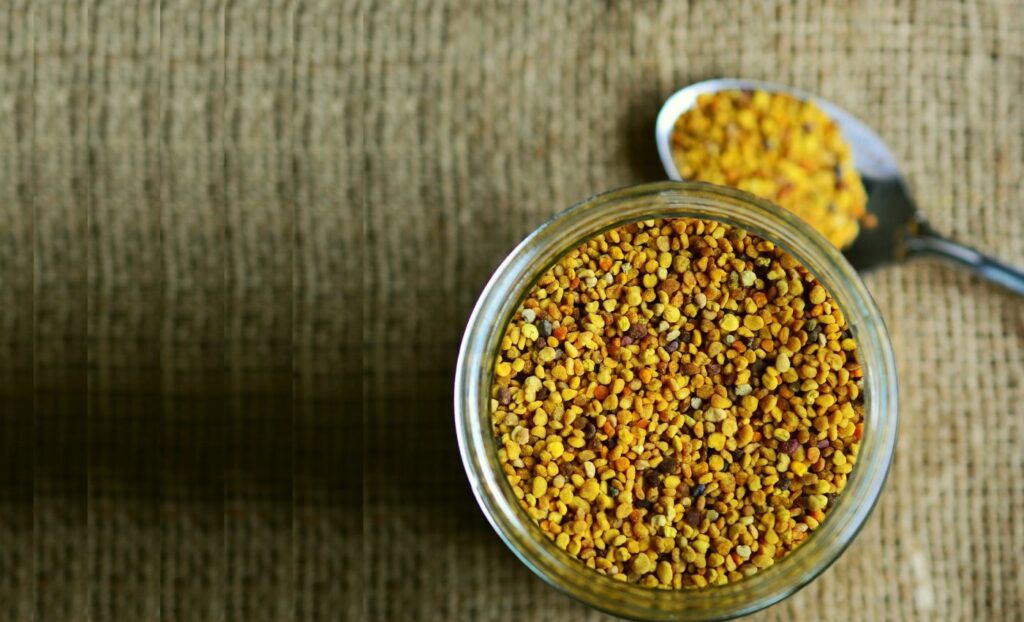Raw pollen, often called “bee pollen,” is a natural superfood collected by honeybees from flowering plants. Packed with essential nutrients, enzymes, and antioxidants, it has been used for centuries in traditional medicine for its health-boosting properties.
But what exactly makes raw pollen so beneficial, and are there any risks to consider?
In this article, we’ll explore:
✔ The nutritional properties of raw pollen
✔ Its top health benefits
✔ Possible contraindications and side effects
What Is Raw Pollen?
Raw pollen consists of tiny granules that bees gather from plant stamens. It serves as a primary protein source for the hive and is rich in bioactive compounds. Unlike processed pollen, raw pollen retains all its natural enzymes and nutrients.
Nutritional Profile
Raw pollen is a powerhouse of essential nutrients, including:
- Proteins & Amino Acids (up to 30% protein, including all essential amino acids)
- Vitamins (B-complex, C, D, E, and K)
- Minerals (magnesium, calcium, potassium, zinc, selenium)
- Antioxidants (flavonoids, carotenoids, quercetin)
- Enzymes & Co-enzymes (aiding digestion)
- Healthy Fats (omega-3 and omega-6 fatty acids)
Top Health Benefits of Raw Pollen
1. Boosts Immunity
Raw pollen has antimicrobial and antiviral properties, helping the body fight infections. Its high antioxidant content also reduces oxidative stress, strengthening immune defenses.
2. Enhances Energy & Stamina
Athletes and active individuals use bee pollen as a natural energy booster due to its high protein, B vitamins, and carbohydrate content.
3. Supports Digestive Health
The enzymes in raw pollen (amylase, protease, lipase) aid digestion and improve gut health. It may also help with intestinal inflammation and bloating.
4. Reduces Inflammation & Allergies
Studies suggest that raw pollen can reduce histamine reactions, helping with seasonal allergies. Its anti-inflammatory effects may also benefit conditions like arthritis.
5. Promotes Skin Health
Thanks to its antioxidants and amino acids, raw pollen supports collagen production, reduces acne, and promotes a youthful glow.
6. Supports Heart Health
The flavonoids in pollen help lower cholesterol and improve circulation, reducing the risk of cardiovascular diseases.
7. Balances Hormones
Raw pollen contains phytoestrogens, which may help regulate hormones, easing symptoms of menopause and PMS.
Possible Contraindications & Side Effects
While raw pollen is generally safe for most people, some should use caution:
1. Allergic Reactions
- Those allergic to bee stings or pollen may experience itching, swelling, or anaphylaxis (rare but serious).
- Start with a tiny dose (a few granules) to test tolerance.
2. Pregnancy & Breastfeeding
- Limited research exists, so consult a doctor before use.
3. Autoimmune Conditions
- Since pollen stimulates the immune system, those with autoimmune disorders (e.g., lupus, MS) should avoid it unless approved by a physician.
4. Blood Thinners Interaction
- Pollen contains vitamin K, which may interfere with blood-thinning medications like warfarin.
How to Consume Raw Pollen
- Start small (½ tsp daily) and gradually increase to 1-2 tsp per day.
- Mix into smoothies, yogurt, or oatmeal.
- Avoid heating to preserve enzymes.

Raw pollen is a nutrient-dense superfood with impressive health benefits—from boosting immunity to enhancing skin and digestion. However, those with pollen allergies or certain medical conditions should use it cautiously.
Have you tried raw pollen?
Share your experience in the comments!

